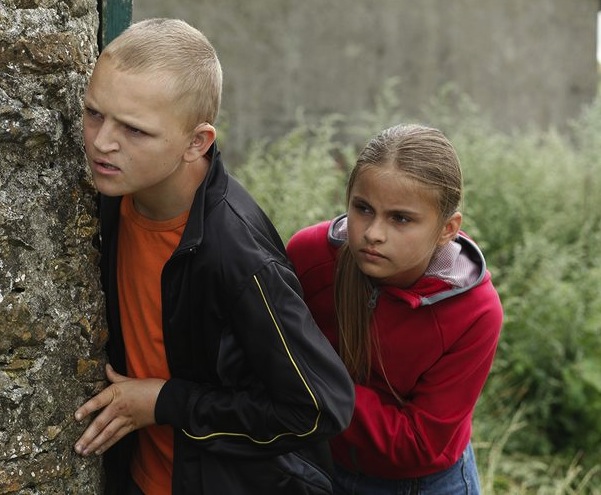Film Review: Boston MFA’s French Film Festival — The Beautiful Idiosyncrasy of “P’tit Quinquin”
Though director Bruno Dumont’s joining of adolescent romance and occult-tinged police procedural occasionally seems basted together, there’s a winning combination of goofy humor and social critique.
P’tit Quinquin/ Li’l Quinquin – Directed and written by Bruno Dumont. Playing at the Boston Museum of Fine Arts as part of the French Film Festival on July 24 at 7 p.m. and on July 26 at noon. Available on DVD from Kino Lorber.

Kid actors Alane Delhaye and Lucy Caron in a scene from “P’tit Quinquin.”
By Betsy Sherman
It’s the beginning of summer vacation and the beach is the saddest place in town. The kids go into the frigid water up to their knobby knees, then retreat across the rocky “sand” to sit by a graffiti-covered bunker built by the Germans during the Occupation. If they’re lucky, they’ll find another crusty grenade to add to their collection.
P’tit Quinquin is director-writer Bruno Dumont’s backhanded valentine to his native Nord-Pas-de-Calais, a region of northeastern France that sits on the English Channel and near the border with Belgium. Dumont has made a string of must-see dramas in which he investigates the links between the spiritual and the corporeal. In his austere films, which include L’humanité, Hadewijch and Outside Satan, the filmmaker succeeds in slowly ratcheting up a sense of dread. P’tit Quinquin is his first made-for-TV miniseries, his first movie with a child protagonist and his first comedy — although a Dumont comedy predictably has some scuro mixed in with the chiaro. It’s nice to see Dumont in a loosey-goosey mode, and although the joining of adolescent romance and occult-tinged police procedural occasionally seems basted together, there’s a winning combination of goofy humor and social critique.
The phrase that gives the movie and the central character their name is the title of a song written in the 1850s in the Picard language (it translates as “little child”) which has become an anthem for the region. In light of that choice, one can assume that Dumont, who uses non-professional actors in his films (the exception being Camille Claudel 1915, starring Juliette Binoche), would hope to find a kid with qualities emblematic of the locality. Alane Delhaye, with his squashed-to-one-side nose and asymmetrical mouth, could be a renegade from Munchkinland’s Lollipop Guild. He’s instantly watchable, and becomes more than just that: he gives a terrific performance that ranges from tough to tender and shows that while his character’s acceptance of handed-down values isn’t always attractive (suspicion toward authority is OK but bigotry against Muslims is certainly not), he has a fundamental decency.
P’tit Quinquin, who’s around 13 years old, comes from a rough-hewn farm family; his sweetheart Eve (Lucy Caron) lives at the farm next door but comes from gentler stock. As summer vacation kicks off, the kids are jazzed at the sight of a helicopter lifting a dead cow out of an old bunker. A forensic specialist proclaims that inside the cow are the chopped-up remains of a human being. The series’ four episodes of about 50 minutes each introduce us to the townspeople and various outside authorities who try to cope with further mysterious murders (some, but not all, of which are barnyard animal-related) and with a tragic suicide.
These developments, and a sub-theme of tension that may have been exacerbated by an interracial adulterous affair, don’t seem like a source for many yuks. Twin Peaks is an ancestor of P’tit Quinquin in its deadpan-hilarious look at gruesome subject matter, but Dumont may have reached all the way back to the silent-clown era when he cast Bernard Pruvost as Captain Rogier Van der Weyden who, along with Lieutenant Rudy Carpentier (Philippe Jore), ineptly conducts the investigation. While the Lieutenant grasps at the lofty (he dubs the person-stuffed cow a “human beast … like in Zola”), the addle-brained Captain at first gets mired in the trivial, yelling at the kids because of where they’re riding their bikes, and later on pole-vaults into the apocalyptic (“We’re at the heart of evil …”).

Bernard Pruvost plays the bumbling Captain Rogier Van der Weyden in “P’tit Quinquin.”
It’s hard to overstate what a comic gem Dumont found in Pruvost. A gardener by profession, the first-time actor happened to be temping at the building in which casting for P’tit Quinquin was headquartered. An assistant director spotted his shock of white hair and sad brown Chaplinesque eyes and asked if he’d like to audition. Pruvost may also have been chosen for his array of facial tics (it’s possible they’re part of the performance, but they seem more like a pre-existing condition). Dumont didn’t give his cast members a script that they had to memorize, rather he told them where the story needed to go and let them fill in dialogue. Pruvost, in addition to his natural skill at slapstick, provided several memorable comic lines, for which his dentally challenged co-star Jore served as an able straight man. For example, when the Lieutenant names a man as the probable killer, the Captain ponders a bit and states matter-of-factly, “Kill, chop, stuff. That’s a lot for one man.” As the story rambles on, you figure that Van der Weyden’s got to be a Columbo. Could he really be that dim? Fortunately, in the meantime, P’tit Quinquin steps in and does a bit of sleuthing that pays off.
For those lucky enough to see it in a theater, P’tit Quinquin won’t look like TV. Dumont shoots in his usual widescreen format. His obvious affection for the long shot and the close-up (both the scenery and the faces are picturesque) are in line with his general interest in contrasts (all of his films place grace right up against crudeness). The first three chapters feature set-pieces, respectively an awkwardly funny funeral, a singing contest, and a Bastille Day parade complete with drum majorettes. There’s no musical score to guide audience reaction, although a song sung by one of the characters (written by the actress, Lisa Hartmann) casts a spell. Be prepared for idiosyncrasy to take precedence over plot, and for nature to keep hold of its secrets. And rejoice in the discovery of Delhaye and Pruvost, who have started a beautiful friendship with the camera.
Betsy Sherman has written about movies, old and new, for The Boston Globe, The Boston Phoenix, and The Improper Bostonian, among others. She holds a degree in Archives Management from Simmons Graduate School of Library and Information Science. When she grows up, she wants to be Barbara Stanwyck.
Tagged: Boston French Film Festival, Bruno Dumont, Li’l Quinquin / P’tit Quinquin


So glad you wrote about this. Dumont is always a surprise, though not always a pleasant one. This makes it clear that his new endeavor is a must see that I, unfortunately, am unable to get to. Disappointed, I will be looking for a screening somewhere else in the future. (Do you know anything about a release?)